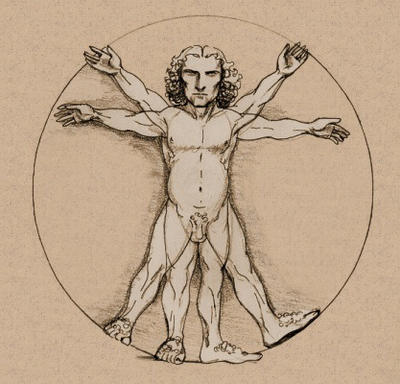Hobbits decide close Kiwi election
 Leonardo daVinci's depiction of a Hobbit:
Leonardo daVinci's depiction of a Hobbit:Why New Zealand will keep banning
US nuclear weapons in its territorial waters.
AGENCE VLEEPTRON-PRESSE ANALYSIS: It looks as if New Zealand's Labour Party Prime Minister Helen Clark has, by a weekend election squeak, beaten away a challenge by the conservative National Party. But to rule in Parliament, Labour will have to seek the backing of smaller parties to form a coalition.
The leader of the defeated National Party, Don Brash, had promised to allow, for the first time in decades, US Navy ships to enter NZ territorial waters without first telling NZ whether they were carrying nuclear weapons.
In exchange, Brash expected that trade relations (NZ agricultural exports) between NZ and the USA would normalize to NZ's advantage. But his economic arguments for healing the rift in the traditional Cold War-era ANZUS treaty did not resonate with voters enjoying the Clark-era's record low unemployment and a surge in tourism from abroad sparked by the "Lord of the Rings" movies.
So the popularity of the Nuclear-Free Pacific movement continues ... due, apparently, to hobbits and low unemployment.
***********
Tuesday 20 September 2005
New Zealand's main parties test coalition waters
WELLINGTON (Reuters) -- New Zealand's ruling Labour party held talks on Tuesday with the third biggest political group on forming a government after a nail-biting election, but the main opposition party said it was still in the race.
The outcome of the weekend election remains in the balance, with Labour taking 50 seats against the opposition National Party's 49 in the 122-member parliament. The results will be finalised on October 1 after counting of 218,000 absentee votes.
The razor-thin margin between the two main parties means the support of some of the six minor parties will be needed for either of them to govern.
Prime Minister Helen Clark, seeking to become the first Labour leader to win three straight terms, met the leader of the nationalist New Zealand First Party, which has seven seats.
NZ First, headed by veteran politician and former cabinet minister Winston Peters, has signalled in the past it could offer support to the party which won the most seats.
"New Zealand First's position is that following the final election result, the party with the most seats in the first instance is entitled to form a government and New Zealand First will act to provide stability," Clark and Peters said in a joint statement.
Before the election result, NZ First had said it would not formally join any coalition.
But Don Brash, leader of the main opposition National party, said there was still a chance he could lead a centre-right government after absentee votes were counted.
"My intention at the moment is to negotiate a National-led government and I have not given up that possibility at all," the former central bank governor told reporters after a meeting of the party caucus.
Brash met leaders of the fledgling Maori party to explore common ground after his party campaigned on a promise to end special privileges for the indigenous Maori, who make up 15 percent of the 4.1 million population. But no details were given.
Brash was confirmed as National's leader at the first meeting of its enlarged caucus. It now has 49 lawmakers, up from 27 before the election.
However, Brash, 64, stopped short of saying he would lead National into the 2008 election if the party did not form the next government.
"I don't want to cross those bridges at all ... At this stage I'm staying on," he told reporters.
© Reuters 2005. All Rights Reserved.


0 Comments:
Post a Comment
<< Home